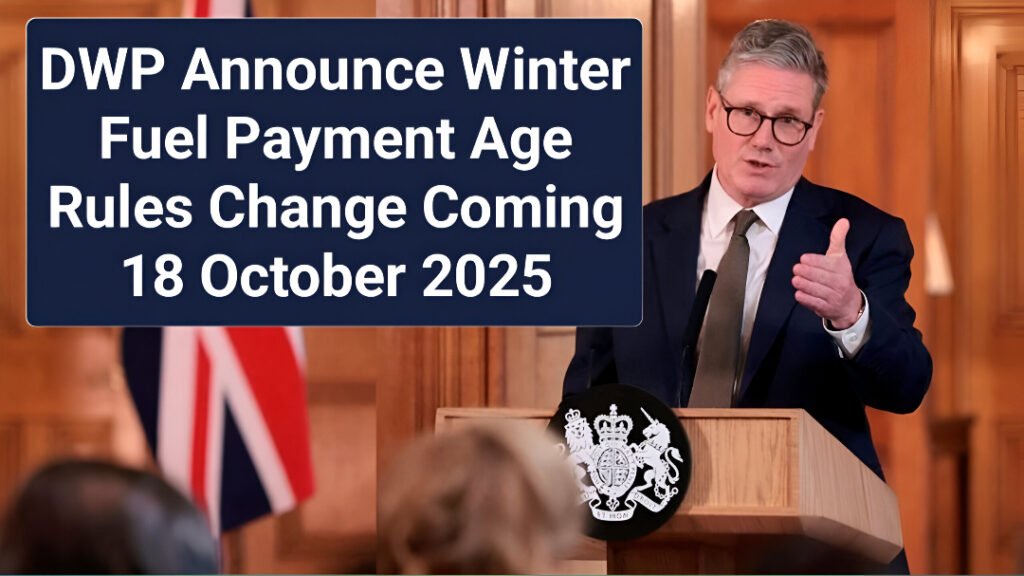Hello Everyone, The Department for Work and Pensions (DWP) has officially confirmed changes to the Winter Fuel Payment age rules, set to come into effect from 18 October 2025. This announcement has generated widespread attention across the UK, especially among older residents who rely on this annual benefit to help cover heating costs during the cold winter months. In this article, we will explore what these changes mean, who will be affected, and how residents can ensure they continue receiving support.
What is the Winter Fuel Payment?
The Winter Fuel Payment is a government initiative aimed at helping older citizens manage the rising costs of heating during the winter. Traditionally, eligible individuals receive a lump sum payment each year, which can range from £250 to over £600 depending on circumstances.
The payment is designed to support pensioners, ensuring that they can maintain a warm and safe environment in their homes during the cold season. It is not means-tested, which means that most eligible recipients automatically qualify based on their age and residency status in the UK.
Age Rule Changes from October 2025
Starting 18 October 2025, the DWP will implement updated eligibility criteria based on age. These changes are primarily focused on aligning the payment age with current pension rules and addressing demographic shifts in the UK.
Previously, individuals aged 60 and above could receive the Winter Fuel Payment. The new rules will adjust this age threshold, potentially affecting younger pensioners who were previously eligible. Key points of the change include:
-
The qualifying age for Winter Fuel Payment will increase to align with the state pension age.
-
Individuals turning 60 but below the new threshold may not be automatically eligible after the update.
-
Current recipients who already receive payments will continue until further notices are issued.
This change reflects ongoing efforts by the government to streamline benefits and ensure financial sustainability amid rising energy costs.
Who Will Be Affected?
These changes will primarily affect two groups of people:
-
Younger Pensioners: Those who are currently eligible due to being 60 or above but have not yet reached the state pension age.
-
New Applicants: Individuals applying for the Winter Fuel Payment after 18 October 2025 will need to meet the revised age criteria.
However, it is important to note that existing recipients who are already receiving payments will not immediately lose their benefit. The DWP has confirmed that transitional arrangements will be in place to prevent sudden financial disruption. Important considerations:
-
Residents approaching 60 should check the updated eligibility rules carefully.
-
Those already receiving payments should ensure their personal information with the DWP is up-to-date to avoid delays.
-
Individuals living abroad may have different eligibility criteria, depending on residency history.
How to Check Eligibility
Ensuring eligibility under the new rules requires a few simple steps:
-
Visit the official DWP website to review updated guidance.
-
Use the online Winter Fuel Payment calculator to see if you qualify.
-
Contact the DWP helpline for personalised advice.
It is advisable to check eligibility well before the winter months, as payments are typically processed automatically for those who meet the criteria. Early action can help prevent delays or missed payments.
Application Process and Key Dates
The application process for the Winter Fuel Payment has been straightforward, and the DWP plans to maintain this approach. Applications can be submitted online or via post, and most people do not need to apply at all if they are already known to the DWP. Key dates to remember:
-
18 October 2025: New age rules take effect.
-
Winter 2025: Payments are generally made between November and December.
-
Ongoing: Applications and enquiries can be submitted at any time, but early submission ensures timely payments.
Tips for Maximising Your Winter Fuel Support
Even with the changes in age eligibility, there are ways for pensioners to make the most of available support.
-
Check Other Benefits: Pension Credit, Cold Weather Payment, and other local grants may supplement Winter Fuel Payment.
-
Energy Efficiency: Investing in insulation, smart meters, or energy-saving devices can reduce overall heating costs.
-
Community Support: Local councils and charities often offer advice and help for older residents struggling with energy bills.
What the Government Says
The DWP has emphasised that these changes are part of a broader strategy to modernise welfare support while ensuring that resources are targeted effectively. In a statement, the department noted:
We remain committed to supporting older residents during winter, and these updates will ensure that support continues for those who need it most.”
This reassurance aims to provide clarity for affected residents while signalling that transitional arrangements will prevent abrupt changes.
Impact on UK Residents
The new age rules may initially cause confusion, but the overall impact is expected to be manageable. Most current recipients will continue receiving payments, and younger residents approaching the new eligibility age are advised to plan ahead.
The changes also highlight the importance of staying informed about government benefits. With rising energy costs and inflation pressures, timely knowledge and proactive management of entitlements can make a significant difference for older residents. Potential outcomes of the age change:
-
Slight reduction in the number of new applicants eligible for Winter Fuel Payment.
-
Increased awareness and engagement with other benefits.
-
Encouragement for early retirement planning and financial preparedness.
Conclusion
The DWP’s announcement regarding Winter Fuel Payment age rules, effective from 18 October 2025, marks a significant update for UK pensioners. While the changes will affect eligibility, the government has assured transitional support to minimise disruption.
Residents approaching the new age threshold should proactively check eligibility and explore complementary benefits to ensure they receive adequate financial support during winter. Staying informed and acting early will help ensure a warm and comfortable winter season for all eligible individuals.
